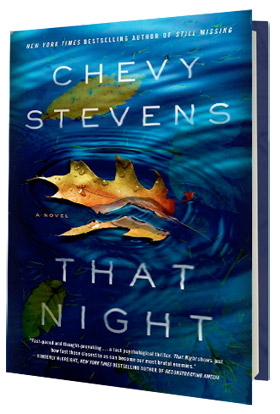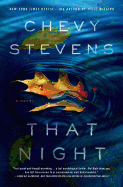That Night
by Chevy Stevens
In the small town of Campbell River on Vancouver Island in the late 1990s, Toni Murphy can't wait to graduate from high school. Her parents are totally hassling her: they disapprove of her boyfriend, Ryan; her mom is controlling and angry; her father has become distant. A group of popular girls at school is determined to make her life miserable, and her too-perfect little sister, Nicole, has recently started hanging out with those very girls. Toni and Ryan intend to save a little money, get an apartment together and, eventually, leave town for good. Things are a bit rough at home, but they have a plan, and they are so close....
Then, one night, Nicole is killed. Toni and Ryan are convicted of her murder and sent to prison.
Nicole's killer--or killers--not only took the life of their victim, but effectively Toni and Ryan's as well, and the young love they shared: once out on parole they will never be allowed contact again. Toni and Nicole's parents' lives are ruined as well. Their mother holds onto her rage against her elder daughter, and their father's indecision about whom to support ends up supporting no one.
Seventeen years later, Toni is being processed out of prison and into a halfway house when we meet her in the opening lines of That Night, the fourth novel by Chevy Stevens (Still Missing). She is frightened and unsure of how she'll readjust to the outside world. It was so painful on the inside--being separated from Ryan and everything she knew--that the only way she could cope was to shut down. She stopped writing to Ryan in the men's prison, asked her father to stop visiting and got into a lot of fights. Now that she's out, her fellow parolees at the halfway house want to continue with violence, and Ryan wants to renew contact. He's intent upon solving the crime they've been convicted of, but violating the parole conditions that forbid contact could land both of them back in prison; anyway, Toni feels the best way to move on is to put Nicole's murder behind her. In returning to her hometown, however, she finds that no one else is ready to do that. Her mother is still furious, believing Toni killed her little sister; her father is still unsure whose side he's on; it's nearly impossible for an ex-con to get work, and even harder for her to keep it. And Toni's high school nemeses, Shauna and her henchwomen, are still around, and still have a bone to pick. She makes just one friend: a rescue pit bull named Captain.
Slowly, Toni begins to settle in. Back in Campbell River, she goes to work at the Fish Shack, where she waited tables in high school--now they keep her (and her prison tattoos) hidden away in the kitchen. She lives with Captain on a small boat and checks in with her parole officer daily. Toni has now experienced severe bullying, incarceration and an egregious failure of the criminal justice system; at 34 years old, she'd like to just be left alone to put together whatever life she can. She doesn't visit her parents, but she does see Ryan hanging around the marina where she lives. He's pushing ahead in investigating Nicole's death, against Toni's advice, and he has his eyes on the girls who picked on her in high school--Shauna and her clique testified against Ryan and Toni at the trial, and Ryan wants to know why. What really happened that night? As Ryan's investigations approach the truth, the events of 17 years ago feel very recent indeed; Toni may be in danger--and she may not be the only one.
That Night shifts back and forth between the events of 1996, when Toni's teenaged world fell apart, and the present, with Toni newly released from prison and struggling to rebuild her life. Both are told in first person by Toni herself, although in two subtly different voices: that of the rebellious teen with short-term concerns and long-term dreams, and that of the ex-con whose hard-won and carefully constructed defense system is still brittle. This nonlinear style highlights Toni's sense of confused and harried apprehension, of disruption. Flashbacks allow the reader to visit Toni behind bars, and these scenes, too, are evocative and disturbing.
Stevens matches the success of her previous novels with character-driven drama and a clear commitment to the particular nuances of her Vancouver Island setting. A strong sense of foreboding and a thoroughly compelling plot keeps her reader guessing, while a hint of romance broadens the appeal. Toni's gritty, emotional, traumatized persona is both gripping and sympathetic. Foreshadowing and terrifying suspense are riveting in Stevens's sure hands; readers will want to keep all the lights on as That Night moves into its final acceleration. --Julia Jenkins








